com-, co-, cog-, col-, con-, cor-
(Latin: together, together with, with)
The prefix com- is assimilated to co- before h, w, and all vowels:
The prefix com- becomes, cog- before g: cognition, [co + gnoscere, "to know"], et al.
The prefix com- becomes, col- before l: colloquial, et al.
The prefix com- becomes, con- before c, d, g, j, n, q, s, t, v: covivant, et al.
The prefix com- becomes, cor- before r: corrigible, et al.
The words for this unit show cartoons for all of the examples of the com-, co-, cog-, col-, con-, cor- entries; however, there are many more of them which exist in other units which are available when you type in a particular word in the search box at the bottom of this page.
connive (verb), connives; connived; conniving
1. To cooperate secretly in an illegal or wrongful action; to collude; to conspire: The dealers connived with customs officials to bring narcotics across the border from Mexico.
2. To avoid noticing something wrong; to give aid to wrongdoing by not telling about it or by secretly helping it take place: The new mayor of the town was absolutely straightforward and honest and didn’t connive at all like his predecessor with illegal activities.
3. To feign ignorance of or fail to take measures against a wrong; therefore, implying tacit encouragement or consent: A prison guard connived in aiding a prisoner's escape and he was later suspended from his position.
4. To avoid noticing something that one is expected to oppose or to condemn; to give aid to wrongdoing by not acting or speaking out about an illegal act: Although Jack had seen that his friend had hit another student, he connived by not telling the teacher what had happened.
5. To indulge to do something others oppose or criticize: June said her fellow workers connived to defeat the proposal that their company should increase the prices of their products.
6. To pretend ignorance of or failing to take action against something someone ought to have opposed: Cathy connived to stop the appointment of the new supervisor although all of her colleagues were giving their support to have him.
7. To indulge in or be involved in secret sympathy, to wink at, to cooperate with secretly, or to have a secret understanding: The two sisters connived to watch a TV program late at night after their parents had gone to bed!
8. Etymology: from Latin conivere, "to wink"; from com-, "together" + basic element nictare, "to wink". Hence, "to wink at (a crime), to be secretly knowledgeable".
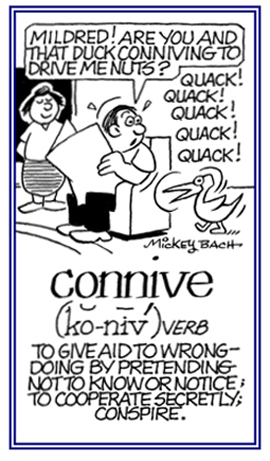
© ALL rights are reserved.
Go to this Word A Day Revisited Index
2. To avoid noticing something wrong; to give aid to wrongdoing by not telling about it or by secretly helping it take place: The new mayor of the town was absolutely straightforward and honest and didn’t connive at all like his predecessor with illegal activities.
3. To feign ignorance of or fail to take measures against a wrong; therefore, implying tacit encouragement or consent: A prison guard connived in aiding a prisoner's escape and he was later suspended from his position.
4. To avoid noticing something that one is expected to oppose or to condemn; to give aid to wrongdoing by not acting or speaking out about an illegal act: Although Jack had seen that his friend had hit another student, he connived by not telling the teacher what had happened.
5. To indulge to do something others oppose or criticize: June said her fellow workers connived to defeat the proposal that their company should increase the prices of their products.
6. To pretend ignorance of or failing to take action against something someone ought to have opposed: Cathy connived to stop the appointment of the new supervisor although all of her colleagues were giving their support to have him.
7. To indulge in or be involved in secret sympathy, to wink at, to cooperate with secretly, or to have a secret understanding: The two sisters connived to watch a TV program late at night after their parents had gone to bed!
8. Etymology: from Latin conivere, "to wink"; from com-, "together" + basic element nictare, "to wink". Hence, "to wink at (a crime), to be secretly knowledgeable".

Go to this Word A Day Revisited Index
so you can see more of Mickey Bach's cartoons.
1. Someone with informed and discriminating taste: Mark and Madeline were connoisseurs of fine wines.
2. Those who are especially competent in sharing critical judgments in an art, particularly one of the fine arts, or in matters of taste: Madeline was a connoisseur of modern-artistic portraits.
3. A discerning judge of the best in any field: Bert was a connoisseur of race horses, having been in this profession for more than 30 years.
4. Etymology: from Old French connoisseor; from connoistre, "to know"; from Latin cognoscere, "to learn, to know, to recognize"; from com-, "with, together" + gnoscere, "to recognize".

© ALL rights are reserved.

© ALL rights are reserved.
Go to this Word A Day Revisited Index
2. Those who are especially competent in sharing critical judgments in an art, particularly one of the fine arts, or in matters of taste: Madeline was a connoisseur of modern-artistic portraits.
3. A discerning judge of the best in any field: Bert was a connoisseur of race horses, having been in this profession for more than 30 years.
4. Etymology: from Old French connoisseor; from connoistre, "to know"; from Latin cognoscere, "to learn, to know, to recognize"; from com-, "with, together" + gnoscere, "to recognize".


Go to this Word A Day Revisited Index
for a list of additional Mickey Bach illustrations.
A commonly understood cultural or emotional association that some word or phrase carries: The term “home” has a connotation of family, comfort, warmth, security, and love; however, it also simply means a place where people live whether in harmony or not.

© ALL rights are reserved.
Go to this Word A Day Revisited Index

Go to this Word A Day Revisited Index
so you can see more of Mickey Bach's cartoons.
1. Relationship by descent from the same ancestor, and not by marriage or a special friendship: The four brothers consanguinities were obvious and clearly seen by others.
2. Etymology: from Latin consanguinitas, from consanguineosus; from con-, "together" + sanguineus, "of or pertaining to blood"; from sanguis, "blood".
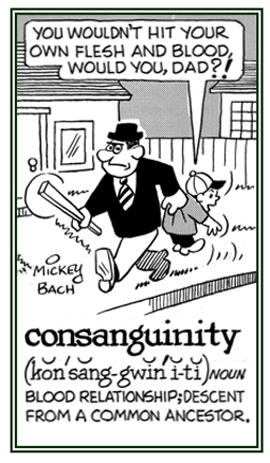
© ALL rights are reserved.
Go to this Word A Day Revisited Index
2. Etymology: from Latin consanguinitas, from consanguineosus; from con-, "together" + sanguineus, "of or pertaining to blood"; from sanguis, "blood".

Go to this Word A Day Revisited Index
so you can see more of Mickey Bach's cartoons.
consort (verb), consorts; consorted; consorting
To keep company or to associate with others: Susan likes to consort with her friends when they meet every Saturday for coffee and cake in the afternoon.

© ALL rights are reserved.
Go to this Word A Day Revisited Index

Go to this Word A Day Revisited Index
so you can see more of Mickey Bach's cartoons.
An individual in an area or district who votes for his or her person in congress and who is represented by him or her for the congressional period in office: The constituents in the town really liked Jim as a person, but he didn’t seem to make much headway in presenting their views and wishes in the legislative assemblies.
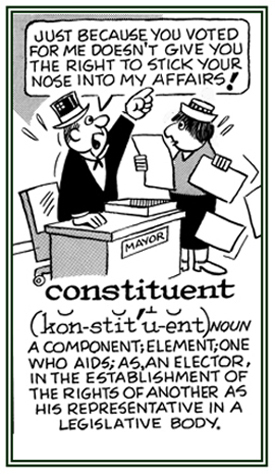
© ALL rights are reserved.

© ALL rights are reserved.
Go to this Word A Day Revisited Index


Go to this Word A Day Revisited Index
so you can see more of Mickey Bach's cartoons.
constrained (adjective), more constrained, most constrained
Descriptive of that which causes someone to appear unnaturally forced or compelled to do something, typically because of embarrassment or of a social situation with someone: Bill was quite constrained when he accidentally met his girlfriend while he was shopping with his mother at the department store.
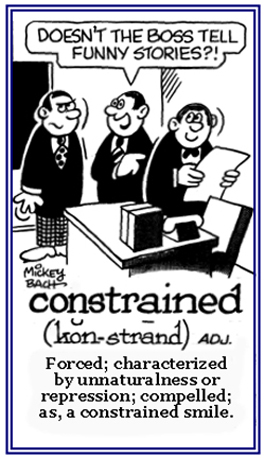
© ALL rights are reserved.

© ALL rights are reserved.
Go to this Word A Day Revisited Index


Go to this Word A Day Revisited Index
so you can see more of Mickey Bach's cartoons.
constricted (adjective), more constricted, most constricted
Limited, impeded, or bound to one place: Some extremely poor people had a very constricted way of existing in Ted's city since they only had a bridge to sleep under or a park bench to sleep on.

© ALL rights are reserved.
Go to this Word A Day Revisited Index

Go to this Word A Day Revisited Index
so you can see more of Mickey Bach's cartoons.
A custom, a habit, or a usage that sometimes has acquired the force of legality: In Germany it has become a consuetude to put flowers next to the road where a relative or a friend died in a traffic accident.
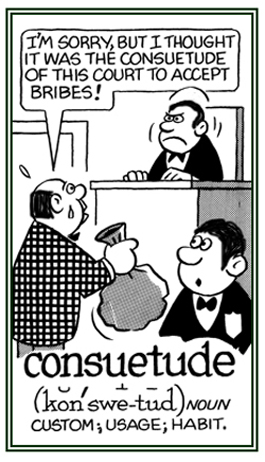
© ALL rights are reserved.
Go to this Word A Day Revisited Index

Go to this Word A Day Revisited Index
so you can see more of Mickey Bach's cartoons.
consummate (KAHN suh mayt") (verb), consummates; consummated; consummating
1. To conclude or to bring to completion: Sam was able to consummate a profitable business transaction with the head of the company.
3. Etymology: from Latin consummatus; from consummare, "to sum up, to make up, to complete"; from con-, "intensive" + summa, "highest degree, total".

© ALL rights are reserved.
Go to this Word A Day Revisited Index
Jed consummated a business transaction with the bank for the money he needed to start his automobile dealership.
2. To achieve or to fulfill: Sharon's dream was finally consummated with the publication of her first book.3. Etymology: from Latin consummatus; from consummare, "to sum up, to make up, to complete"; from con-, "intensive" + summa, "highest degree, total".

Go to this Word A Day Revisited Index
so you can see more of Mickey Bach's cartoons.
consummate (kuhn SUHM it, KOHN suh muht) (adjective), more consummate, most consummate
1. Complete or perfect in every respect; perfect; faultless; skillful: James, who is just 14 years old, plays the piano with consummate ability and talent.
2. Absolutely terrible or utterly bad: Maggie's brother is considered to be a consummate liar and thief.

© ALL rights are reserved.

© ALL rights are reserved.
Go to this Word A Day Revisited Index
2. Absolutely terrible or utterly bad: Maggie's brother is considered to be a consummate liar and thief.


Go to this Word A Day Revisited Index
so you can see more of Mickey Bach's cartoons.
contagious (adjective), more contagious, most contagious
1. Conveying that which spreads easily and likely to make another person or people sick: Certain diseases can be very infectious, or contagious, like measles, mumps, or chickenpox, spreading to others by touching or being in the air.
2. Pertaining to something which causes or is likely to cause the same reaction or emotion in several people; transmittable: Willie's contagious behavior of friendliness was usually conveyed to other people whenever they met him.

© ALL rights are reserved.
Go to this Word A Day Revisited Index
2. Pertaining to something which causes or is likely to cause the same reaction or emotion in several people; transmittable: Willie's contagious behavior of friendliness was usually conveyed to other people whenever they met him.

Go to this Word A Day Revisited Index
so you can see more of Mickey Bach's cartoons.
contemn (kuhn TEM) (verb), contemns; contemned; contemning
1. To view with disrespect; to despise or to have an intense dislike for someone or something: There are people who contemn war and violence in the world because they believe such activities are unjustifiable.
2. Etymology: drom Middle English contempnen, "to slight"; from Latin contemnere; from com-, "with" + temnere, "to despise, to scorn".
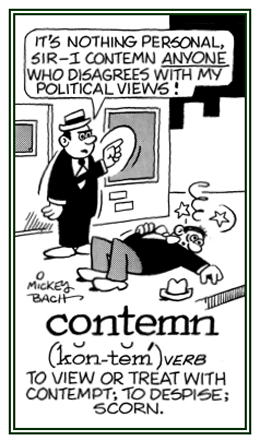
© ALL rights are reserved.
Go to this Word A Day Revisited Index
2. Etymology: drom Middle English contempnen, "to slight"; from Latin contemnere; from com-, "with" + temnere, "to despise, to scorn".

Go to this Word A Day Revisited Index
so you can see more of Mickey Bach's cartoons.
contemplate (verb), contemplates; contemplated; contemplating
1. To think about something as a possible course of action: Jack contemplated moving to a bigger city, thinking that he could find a job with a better salary than he had so far in the village where he lived.
2. To think about something seriously and at length; especially, in order to understand it more fully: Doug sat at his desk working on his web site and made an effort to stop and contemplate what his wife had just said about him wasting his time.
3. To think calmly and at length; especially, as a religious or spiritual exercise: While on vacation in Ireland, Jim was sitting on a cliff contemplating how beautiful the area below was.
4. To look at something thoughtfully and steadily: Jim and Patricia stood in the church and could not help but contemplate the beautiful stained-glass windows.
5. To spend time considering a possible future action or one particular thing for a long time in a serious and quiet way: Mark is contemplating whether his desire of studying biology instead of geography would be a better preparation for getting a job after graduation.
6. To consider carefully and at length; to meditate on or to ponder thoughtfully: At the Art Gallery in Toronto, Canada, Carol contemplated the masterpieces of the Thomson Collection of European Art.
7. To consider carefully and at length; to meditate on or to ponder: David contemplated the problem of moving to a new residence from all angles before he made a decision.
8. To have in mind as an intention or a possibility: After knowing each other for a long time, Tina and Tom finally contemplated marriage.
9. Etymology: from Latin contemplari, "to survey, to observe, to consider"; originally, by augurs (ancient-Roman religious officials who interpreted omens to guide public policies); from con-, "with, together" + templum, "an open place, a sanctuary, a temple" or "place of worship".
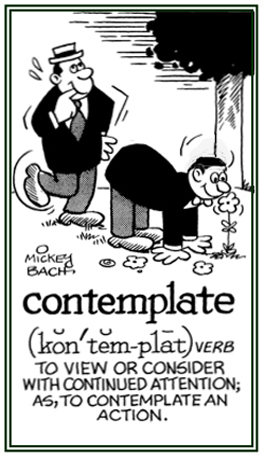
© ALL rights are reserved.
Go to this Word A Day Revisited Index
2. To think about something seriously and at length; especially, in order to understand it more fully: Doug sat at his desk working on his web site and made an effort to stop and contemplate what his wife had just said about him wasting his time.
3. To think calmly and at length; especially, as a religious or spiritual exercise: While on vacation in Ireland, Jim was sitting on a cliff contemplating how beautiful the area below was.
4. To look at something thoughtfully and steadily: Jim and Patricia stood in the church and could not help but contemplate the beautiful stained-glass windows.
5. To spend time considering a possible future action or one particular thing for a long time in a serious and quiet way: Mark is contemplating whether his desire of studying biology instead of geography would be a better preparation for getting a job after graduation.
6. To consider carefully and at length; to meditate on or to ponder thoughtfully: At the Art Gallery in Toronto, Canada, Carol contemplated the masterpieces of the Thomson Collection of European Art.
7. To consider carefully and at length; to meditate on or to ponder: David contemplated the problem of moving to a new residence from all angles before he made a decision.
8. To have in mind as an intention or a possibility: After knowing each other for a long time, Tina and Tom finally contemplated marriage.
9. Etymology: from Latin contemplari, "to survey, to observe, to consider"; originally, by augurs (ancient-Roman religious officials who interpreted omens to guide public policies); from con-, "with, together" + templum, "an open place, a sanctuary, a temple" or "place of worship".

Go to this Word A Day Revisited Index
so you can see more of Mickey Bach's cartoons.
contemptuous (kuhn TEMP choo uhs) (adjective), more contemptuous, most contemptuous
1. Descriptive of deep hatred or negative feelings expressed by a person toward something or someone else; scornful: Paulette's contemptuous tone of voice was dripping with unkindness and disrespect for the neighbor who would not keep his yard clean.
2. Pertaining to how a person feels, expresses, or demonstrates a strong dislike or utter lack of respect for somebody or something: Alexandra thinks it is utter nonsense for anyone to make such contemptuous remarks about that fine actor.
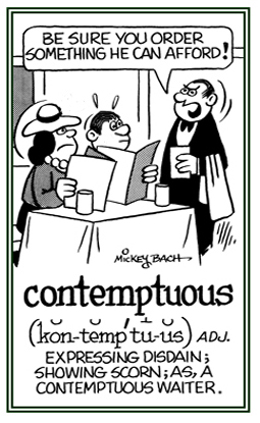
© ALL rights are reserved.
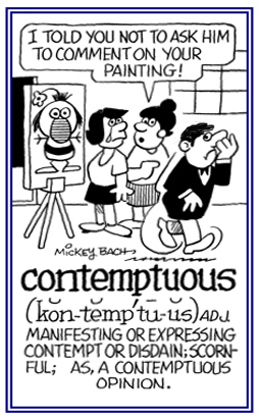
© ALL rights are reserved.
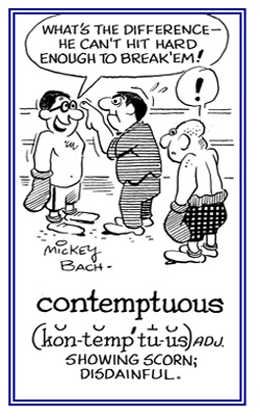
© ALL rights are reserved.
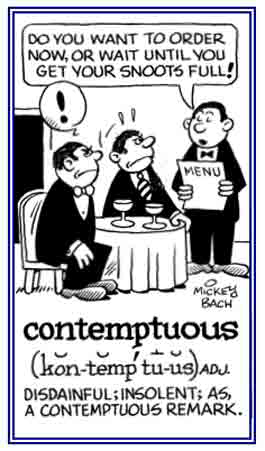
© ALL rights are reserved.
Go to this Word A Day Revisited Index
2. Pertaining to how a person feels, expresses, or demonstrates a strong dislike or utter lack of respect for somebody or something: Alexandra thinks it is utter nonsense for anyone to make such contemptuous remarks about that fine actor.






